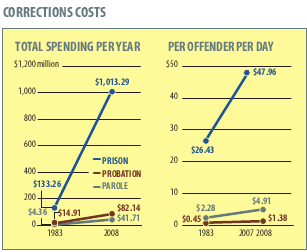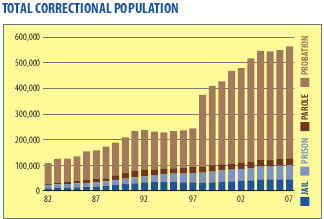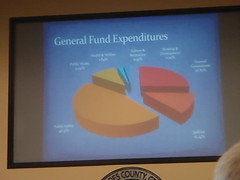And according to Occupy Atlanta this morning: Continue readingWith helicopters hovering overhead, police moved into a downtown Atlanta park and arrested around 50 Occupy Wall Street protesters who had been encamped there for about two weeks early Wednesday….
Organizers had instructed participants to be peaceful if arrests came, and most were. Many gathered in the center of the park, locking arms, and sang “We Shall Overcome,” until police led them out, one-by-one to waiting buses. Some were dragged out while others left on foot, handcuffed with plastic ties.
Police included SWAT teams in riot gear, dozens of officers on motorcycles and several on horseback. By about 1:30 a.m. Wednesday the park was mostly cleared of protesters….
Hundreds of others stood on Atlanta’s famous Peachtree Street, booing police. They shouted “Shame!” and “Who do you protect? Who do you serve?”
Tag Archives: jail
Time to divest from private prison companies
There’s no need to speculate that private prison companies have incentive to keep more people locked up: CCA says so. Kanya D’Almeida wrote for IPS 24 August 2011, ‘Profiteers of Misery’: The U.S. Private Prison Industrial Complex:
What’s this got to do with Georgia? Continue readingCCA’s 2010 annual report states categorically that, “The demand for our facilities and services could be adversely affected by the relaxation of enforcement efforts, leniency in conviction or parole standards and sentencing practices or through the decriminalization of certain activities that are currently proscribed by our criminal laws — for instance, any changes with respect to drugs and controlled substances or illegal immigration could affect the number of persons arrested, convicted, and sentenced, thereby potentially reducing demand for correctional facilities to house them.”
CCA continues, “Legislation has been proposed in numerous jurisdictions that could lower minimum sentences for some non-violent crimes and make more inmates eligible for early release based on good behaviour, (while) sentencing alternatives under consideration could put some offenders on probation who would otherwise be incarcerated. Similarly, reductions in crime rates or resources dedicated to prevent and enforce crime could lead to reductions in arrests, convictions and sentences requiring incarceration at correctional facilities.”
30 jail deaths since 1994 to 2009 —George Boston Rhynes
Churches and pastors need to view this video and see about these animals. That is since we read so much information about the Animal Shelter in our area about abused animals. What about these animals and the thirty deaths that no elected official, church, human being or orgnzations seem to care about.Continue reading
Did you know that Valdosta-Lowndes County Jail is leading the State of Georgia in Jail Deaths for whatever reason. Yet, no one is talking about these people many of whom are military veterans that served their nation. So where is the humanity to man?
Yes, we have had 30 jail deaths since 1994 to 2009 and not the Lowndes County Attorney has put it in a letter in so many words
Disparity in Criminal Justice
Why? Continue readingAccording to the CRF [Constitutional Rights Foundation], over 25 percent of black males and 16 percent of Hispanic males spend time in prison, while only 4 percent of white males do so. Blacks make up only 12 percent of the United States population.
Interview with an architect of Portugal’s successful drug decriminalization
Inês Subtil wrote for communidad segura 11 May 2009, Portugal: Success in harm reduction:
Now that makes a lot of sense. And Portugal demonstrates that it works.In 1999, Portugal broke new ground by enacting legislation that decriminalized all drug use. Ten years later, the results are there for all to see, results of a change that João Goulão, president of the do Instituto da Droga e Toxicodependência (The Drugs and Chemical Addiction Institute) IDT, believes show the law has been instrumental in solving the problem of drug abuse, and crucial for bringing legislation into harmony with practices and people.
A family doctor, Goulão was condecorated by the president of the Portuguese Republic, but he says he is always ready for to roll up his sleeves and get out in the field. At 55, he is a candidate for the Presidency of the European Drugs Observatory, but that has not clowded his sobriety about the work at hand.
In an exclusive interview to Comunidad Segura, Goulão discusses the workings and the structure of the institution that he presides over, that has set a world-wide example of success. For him, drug use is closely associated to self-esteem. “If we could restore drug addicts their human dignity, we would be able to demand something in return. But to make demands of addicts who are enslaved by their addiction is senseless,” he said.
He has more sensible things to say in the interview, including this: Continue reading
1 in 13 Georgia adults in the prison system —Pew Center on the States
 Georgia is number 1 in something: locking people up,
1 in 13 of adults,
according to the Pew Center on the States.
Georgia is number 1 in something: locking people up,
1 in 13 of adults,
according to the Pew Center on the States.
 That costs us more than a billion dollars a year in tax money,
5.9% of the state budget.
That’s up from $133.26 million in 1983, increased by more than a factor of seven.
That costs us more than a billion dollars a year in tax money,
5.9% of the state budget.
That’s up from $133.26 million in 1983, increased by more than a factor of seven.
 Meanwhile, the correctional population swelled from around 100,000 in 1982 to more
than 550,000 in 2007.
And while other states have started decreasing their prison populations,
Georgia’s continues to increase.
The state is even coming up with new ways to lock people up,
such as kicking them out of mental institutions.
We seem headed back towards
plantation slave labor
and
prison road gangs
in for minor drug infractions.
Meanwhile, the correctional population swelled from around 100,000 in 1982 to more
than 550,000 in 2007.
And while other states have started decreasing their prison populations,
Georgia’s continues to increase.
The state is even coming up with new ways to lock people up,
such as kicking them out of mental institutions.
We seem headed back towards
plantation slave labor
and
prison road gangs
in for minor drug infractions.
How about we reverse this trend? Continue reading
Eligible for prison road labor
AP wrote 4 July 2011, GA parolees & road maintenance
Georgia is expanding a pilot program that sanctions some parolees by putting them to work rather than returning them to prison.
The program began in Milledgeville, Gainesville, Columbus and Dalton. This summer it will be expanding to communities across Georgia.
Parolees are eligible if they have committed low-level violations of their supervision requirements, such as the onetime failure of a drug test or curfew violations.
How long will it take before these prisoners are sent to work in fields?
Wouldn’t it make more sense to stop wasting taxpayer dollars on locking up people for minor drug offenses?
Or maybe prison slave labor is a good way to celebrate July 4th.
-jsq
PS: Gretchen got this item from Dwight Rewis of Echols County.
Budget Hearing wrapup: no questions were entertained from citizens
 Paulk and Pritchard wrapped up the budget hearing,
quite well, except at the very end,
when about 2 seconds were allowed for citizens to say they
wanted to speak before the hearing was ended.
So that’s two budget hearings with no citizen input:
the first one nobody knew about,
and this one where nobody was permitted to speak.
Paulk and Pritchard wrapped up the budget hearing,
quite well, except at the very end,
when about 2 seconds were allowed for citizens to say they
wanted to speak before the hearing was ended.
So that’s two budget hearings with no citizen input:
the first one nobody knew about,
and this one where nobody was permitted to speak.
Chairman Ashley Paulk thanked county employees for their cooperation. He noted that even the constitutional officers, who could appeal their budgets, had not. He noted the jail accounted for about half the sheriff’s budget, calling it an expensive operation. He said that his office had accounted for 3 of the 8 layoffs last time, and fortunately there were no more this time. He said: Continue reading
Budget presentation —Stephanie Black @ LCC 28 June 2011
 At Tuesday’s budget hearing,
Lowndes County Finance Director Stephanie Black
presented the proposed 2012 budget to the Commission.
At Tuesday’s budget hearing,
Lowndes County Finance Director Stephanie Black
presented the proposed 2012 budget to the Commission.
 Here are the
details of the budget,
as photographed by Gretchen from the single copy provided for the public
to see by the county clerk.
Here are the
details of the budget,
as photographed by Gretchen from the single copy provided for the public
to see by the county clerk.
 Here are
photographs of her slides.
Here are
photographs of her slides.
Here’s a playlist of the videos.
A couple more videos of this hearing to come of remarks by Chairman Ashley Paulk and County Manager Joe Pritchard in this budget hearing, plus a related video from the Citizens Wishing to be Heard later that same day.
-jsq
Coalition against private prisons in Shelby County, Tennessee
The Mid-South Peace and Justice Center is organizing a broad coalition against private prisons in Shelby County, Tennessee:
They’ve got a report, Progress or Profit? Positive Alternatives To Privatization and Incarceration in Shelby County, Tennessee. Continue reading
No Private Prisons The Shelby County Commission is in the process of trying to privatize our criminal justice system. Private prisons have a well-documented history of inefficient security, poorly trained and underpaid workers, high turnover rates, scant benefits and unprofessional and unsupervised treatment of inmates.The Coalition Against Private Prisons has been created to fight this privatization plan. So far this coalition involves Grassroots Leadership, the Mid-South Peace and Justice Center, the AFSCME local 1733, Shelby County Corrections Officers, Women’s Action Coalition, Mid-South Interfaith Network, educators, faith leaders, artists, and activists.
To address this we are working with our coalition partners and other community organizations to educate Memphians about the dangers of privatization, and to mobilize Memphians around the issue.